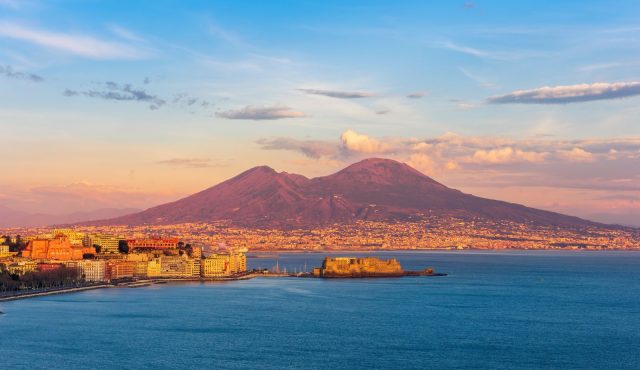
From July 10 to 12, Naples will host a major political event placing it at the center of the European and global stage: the three-day summit organized by the Ecr, a gathering of high-profile political figures, policymakers, and thought leaders to address the future of Europe in terms of sovereignty, security, industrial strategy, and economic growth.
One of the most anticipated moments of the conference will be the panel titled “IMEC: A Glimpse into the Future of Trade Between India, Middle East, Mediterranean, Transatlantic”, which focuses on a bold new geopolitical and economic project that could redefine global trade routes for decades to come: the India-Middle East-Europe Economic Corridor (IMEC).
This high-level panel brings together prominent figures from politics, institutions, and international think tanks. On the Italian side, attendees include Tommaso Foti, Minister for European Affairs, National Recovery and Resilience Plan (NRRP), and Cohesion Policies; Antonio Iannone, Undersecretary of Infrastructure and Transport; and Carlo Fidanza, Member of the European Parliament, Executive Vice President of the European Conservatives and Reformists (ECR) Party, and Vice President of the International Democrat Union (IDU).
Adding a transatlantic perspective is Kaush Arha, President of the Free & Open Indo-Pacific Forum and Senior Fellow at the Atlantic Council in Washington D.C. Representing the industrial sector is Costanzo Jannotti Pecci, President of Confindustria Napoli, who will shed light on the regional economic implications, particularly for Southern Italy.
What is IMEC and Why It Matters
The India-Middle East-Europe Economic Corridor (IMEC) is a groundbreaking initiative launched in 2023, supported by countries including India, Saudi Arabia, the United Arab Emirates, Italy, the European Union, and the United States. This corridor envisions a network of railways, shipping lanes, and digital infrastructure that will connect the Indian subcontinent to Europe through the Arabian Peninsula and the Eastern Mediterranean. It is widely seen as a strategic alternative to China’s Belt and Road Initiative, aiming to foster trade, investment, and political cooperation among a bloc of like-minded partners.
But IMEC is more than just infrastructure. It represents a vision for a new global economic architecture, rooted in free trade, democratic values, and strategic autonomy. For Europe, and particularly for Italy, IMEC opens up new routes for the movement of goods, services, and data—routes that bypass the bottlenecks and vulnerabilities of existing global supply chains.
From the perspective of Italian ports, especially those in Southern regions like Naples, Gioia Tauro, Taranto, and Augusta, the corridor offers a tremendous opportunity. These ports could become critical entry points for goods traveling from Asia to Europe, revitalizing the maritime economy and turning Southern Italy into a strategic logistics hub.
A Maritime Strategy for Europe’s Internal Seas
While IMEC looks eastward and southward, the panel will also reflect on the internal strategic dimensions of Europe’s maritime policy. In a session that blends territorial cohesion, industrial strategy, and blue economy principles, participants will examine the growing importance of the Adriatic, Baltic, and Black Seas—not as fragmented bodies of water, but as integrated strategic anchors of European resilience and competitiveness.
This includes rethinking how port logistics, fisheries, coastal development, and regional innovation ecosystems can work in synergy. As Europe recalibrates its approach to industrial and trade policy, its maritime basins are increasingly recognized as drivers of economic security, energy transition, and local job creation.
By promoting investment in sustainable maritime infrastructure, digital port solutions, and intermodal transport, conservative policymakers argue that Europe can achieve tangible results: not just abstract strategy, but real growth, innovation, and opportunity for coastal communities across the continent.
A Conservative Vision for a Sovereign, Competitive Europe
The IMEC panel fits within the broader political agenda promoted by the European Conservatives, who aim to construct an assertive, sovereign Europe that acts with purpose on the global stage while strengthening its internal economic foundations. The conservative approach emphasizes free enterprise, strategic autonomy, and geopolitical realism, resisting both dependency on external powers and regulatory overreach from within.
Naples is more than a backdrop—it is a symbol of what this vision can achieve: a city at the crossroads of East and West, with centuries of maritime heritage and untapped potential for 21st-century economic leadership. As Italy’s gateway to the Mediterranean, Naples represents the future of a European policy rooted in geography, history, and industrial strength.
In the face of rising global competition and shifting alliances, projects like IMEC signal a renewed commitment to building strategic corridors with trusted partners. For conservatives, this means strengthening ties with democratic allies such as India, Israel, and the United States, while asserting Europe’s place as a central actor in shaping the new world order.
As the summit unfolds in Naples, the IMEC panel will serve as a powerful reminder that infrastructure is policy, and that the sea—long a source of European greatness—may once again be the key to its renewal.



 Subscribe
Subscribe